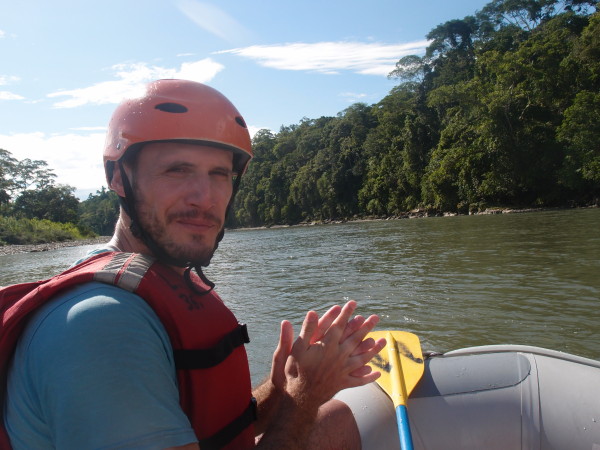
Getting to Tena
The bus ride from Quito to Tena normally takes about 5 hours. I travelled on a Friday so it took 6. It was not as bad as I expected. The bus was very modern and comfortable. To be honest, the 1.5 hour trolley journey from the North of Quito to Quitumbe bus station in the south was harder on me. Having been pickpocketed on the trolley not long before, I was extra careful. I had all my valuables and a hand in one pocket. This technique proved to be a very efficient theft prevention method, but it makes falling over a lot easier too. Take a taxi if you can, it’s $10-15 well spent.
First impressions and public safety in Tena
When you first walk the streets of Tena you get a distinct feeling that you’re in the slums of the city. But after a while you discover that pretty much the whole city looks like that. It was somewhat intimidating at first. But after about two days, I realized that the people of Tena are really friendly and peaceful, there is nothing to be afraid of.
I had a week to spend in Tena, most of which I was working so I only really had 3 days to explore. On the first day I just walked around town. I had no idea where I was going. I crossed the river at some point and ended up in a very strange place in the forest. The area was full of little pools dug into the ground. Some had small fish in them. It must have been an abandoned fishery. I walked on and saw some chicken, which should have been a sign of warning. If there are chicken, there will be dogs too. Within a 100 meters I was unwelcomed by two aggressively, barking dogs. I must have been on someone’s property. I decided to discontinue my exploration of the area and turned back.
I kept walking along the river just for fun. I’d been walking for at least two hours when I reached a village called Pano. It is tiny and even poorer than Tena. I highfived some kids playing in the street and took the bus back to Tena for $0.25.
Nightlife in Tena
It was a Friday night so I had to go and see what the town had to offer in terms of nightlife. I had a nice Amarito cocktail at the not so picturesque riverside and climbed the stairs up to the little lookout at the bridge. I was headed towards a club or discotech as they call them here, but saw a large group leave so I asked them what the place was like. They were going to another place and they invited me to take a cab with them, which I accepted. For a minute I thought this might have been a very stupid idea, but they didn’t kidnap me or anything like that, instead, they took me to a place where I wouldn’t have gotten by myself in a thousand years. Locals only, I was the only gringo.
The bar served beer, which I don’t drink. I saw a bottle of Bacardi so I asked for it with coke. First I didn’t understand why it took so long to make a bacardi cola, but then I saw the guy coming from the nearby shop with a bottle of coke. I also bought my new friend a beer.
The music had to be latin of course, but people didn’t really have a good idea of how to dance to it. Certainly nothing like what they teach in Europe, but not even what I saw in the clubs of Quito. It was the countryside version of salsa, merenge and bachata. When my new friend asked for another beer, I thought I misunderstood something so I asked again to be sure, but I heard it right. He was asking me to buy him another beer. So I thought it was time to say goodbye.
Accommodation in Tena
I picked my accommodation pretty much randomly, but I got very lucky. Tena is full of hostels, some are better than others, but Hostel Limoncocha probably offers the best of view in town. I spent most of my days on the balcony working away and staring at the jungle in the background. It was such a refreshing change after 2 months in Quito.
The owner of Limon Cocha is a German gentleman named Micheal. He is a nice and friendly man, also very knowledgeable of the area. The hostel offers rafting and guided jungle tours.
Rafting in Tena
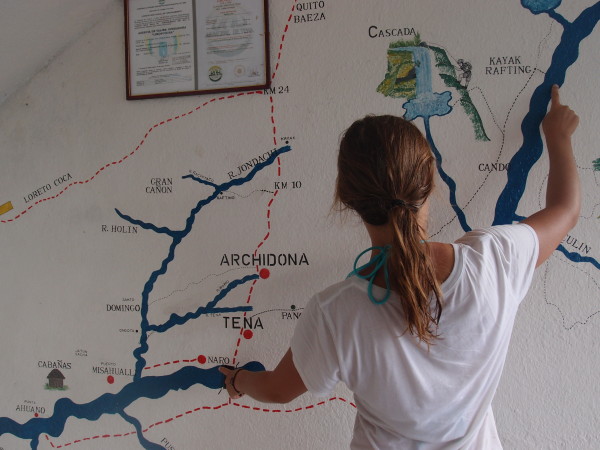
I had the pleasure of joining two young ladies, Hanna and Alina for rafting. Not only were they the perfect rafting crew, but great company as well. The scenery and the landscape was just unbelievable. We rowed 26 kilometers downstream, which is quite a distance, so it’s not the most intense rafting experience you’ll ever have. There are two or three challenging parts in every kilometer, which gives you some time to enjoy the view and the sounds of the jungle. Our rafting guide, Juan, had to work very hard to flip the boat, which he eventually did so no one got out out dry…
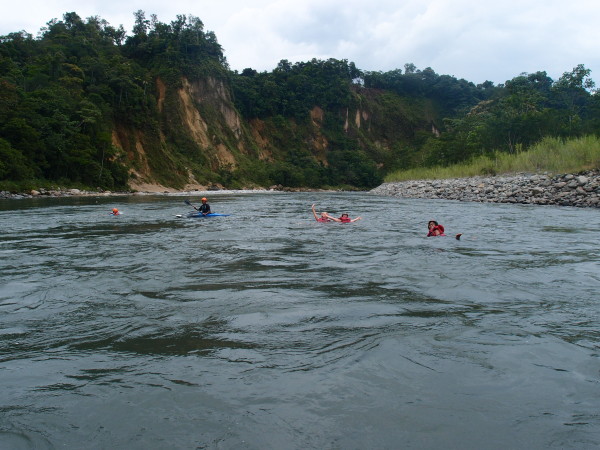
The $50 price included an amazing lunch at the riverside. It was the best tacos I’ve ever eaten and it was served beautifully. The local indigenous kids got our leftovers, which made them very happy.
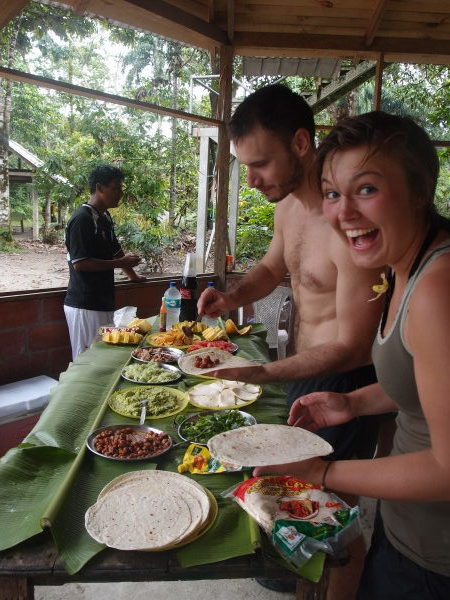
People I met
Hanna and Alina both work as teacher assistants near Esmeraldas at the coast. Alina told me about what it’s like to be a blond gringo girl in Ecuador – I had no idea. I mean even I get a few strange looks every now and then, especially when I run on the main street topless, and make some people laugh, but that’s about it. However, the girls are in the centre of male attention. They get a lot of whistles and comments in the street, but men also approach them all the time. South Americans are no time wasters either, they’ll get straight to the point. After asking for your name, the second question is usually do you have a boyfriend, are you married, do you have children?
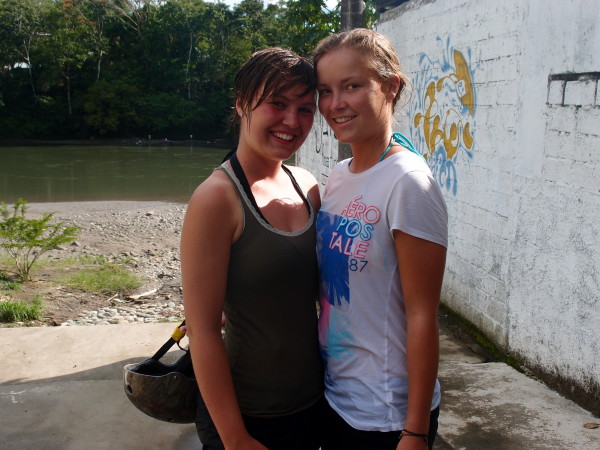
I also met a British gentleman, Brian, who lives in the hostel. He is a retired sailor and is happily married to an Ecuadorian woman, but they don’t live together. He says he doesn’t like it where her wife lives, he prefers Tena. He also has a house in the Antilles, but he likes to be near his wife so he lives in Ecuador. Not too near though I guess. He told me about his brother, who was a very nice man as he put it, but very boring at the same time. “He’s lived all his life in a featureless town in Britain and worked in the same job for 40 years. What stories is he going to tell his grandchildren? His adventures on the way to the factory or what?” For 73, Brian was in outstanding shape. I don’t know if that had anything to do with living on a tropical island, but he would definitely have plenty of stories to tell his grandchildren. If only he had any.
Local economy
One thing I can’t get my head around is the amount of small shops and restaurant in Tena. With a European, but even Eastern European eye, 90% of Tena looks like a slum. And yet you literally can’t walk 50 meters without seeing a little shop or restaurant. It often feels like there aren’t as many people here as there are shops. Go to the furthest street from the center and you’ll still find at least two shops facing each other on every corner offering exactly the same range of products. What you don’t see many of is customers. How all these little shops make a living is beyond me.
Something else you don’t see many of is beggars. I don’t think I’ve seen one in Tena to be honest. And I think that has much to do with all these little shops and the infinite number of people selling fruits, water and ice cream in the street, on buses and literally everywhere. It looks like instead of begging, people here try to make money by selling some basic commodities. And it seems to be working. I wish some governments in Europe adopted this approach and let small businesses flourish. Take away hideous taxes and overprotective health and safety regulations and people will find a way to fend for themselves.
Jungle tour and Misahuallí
On my last day in Tena, I took the bus to Misahuallí, a small jungle town in the junction of two major rivers. I went on a boat tour and visited some indigenous communities. At our first stop we saw traditional pottery using materials exclusively that they would find in the jungle and the preparation of Chicha. Chicha is made of yucca or similar plants and is often fermented bí human saliva to produce alcohol. We got to taste the end results, which I and the rest of the group wasn’t particularly fond of, so our guide drank all of it. We were hoping that he’d still be able to dodge the rocks of the river…Our second stop took as to a little garden where all sorts of herbal and medicinal plants were grown and a little museum showcasing some of the traditional tools of the tribal people. This is where I first saw what I’d been long expecting: fried worms. Call me Mr. unadventurous, but I passed on the opportunity to try this local delicacy. Our final visit took us to another local community where we saw a bit of the traditional costumes and dance.
It was fascinating to dive into the local culture that is completely different from anything I’ve known. The only sad thing was that it didn’t feel real. As soon as we paid our dues and were headed back to our boat, the dancers changed their grass skirts back to jeans.
Photo credit goes to Alina Kern and Hanna. Thanks for sharing your boat with me ladies!
Leave a Reply